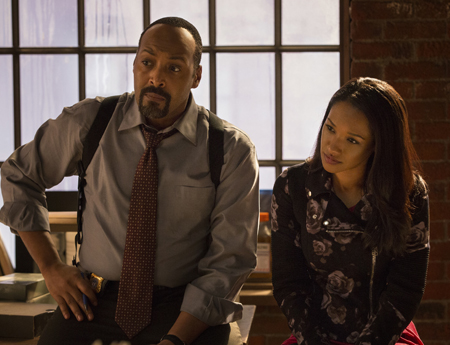Critics Press Networks On Fall Slate Diversity

The smarter way to stay on top of broadcasting and cable industry. Sign up below
You are now subscribed
Your newsletter sign-up was successful
After 16 days of executive sessions, sizzle reels and complimentary Pinot Grigio, the TCA summer press tour closed July 23 with onscreen diversity having emerged as one of its hottest topics. The dialogue peaked when, in her July 17 executive session, CBS Entertainment chairman Nina Tassler fielded questions about the lack of ethnic diversity in CBS’ new fall shows.
One questioner called the network’s new comedies “extremely white.” Another noted that CBS’ freshman slate lacked “a single show where a non-white person is the sole star,” and offered unflattering comparisons to ABC, which two days earlier had touted three new comedies with mostly minority casts and two new dramas featuring large, ethnically diverse onscreen makeups.
“I find that a little bit disingenuous,” CBS Corp. president and CEO Leslie Moonves told B&C at CBS’ press tour party. He pointed to Halle Berry, star of current summer series Extant as an example of diversity on CBS’ air. “I also think some of those people are discounting Asians,” Moonves said, noting coleads Lucy Liu of Elementary and Maggie Q of Stalker.
Still, Moonves conceded, “There’s always more you could be doing. ABC’s doing a great job of doing that. We could be doing more.”
Darnell M. Hunt, director of the Ralph J. Bunche Center for African American Studies at UCLA, would likely agree. Hunt is the author of the Writers Guild of America, West’s annual Hollywood Writers Report. The 2014 version, released in April, found that minorities made up 11% of employed TV writers in 2012, up only one percentage point from 2008.
Hunt called results of the networks’ efforts to diversify writers’ rooms “abysmal,” but said he sees progress onscreen. “I think this year, at least from what I’ve seen, in terms of what the networks are hyping for their fall lineup, it appears to be a pretty momentous year for diverse representation,” Hunt said. “It seems like something interesting happened at ABC this year. I’m not sure exactly how it happened.”
ABC is not the only network showing signs of progress. This fall, Fox will premiere Gracepoint, adapted from the U.K. series Broadchurch. In the U.S. version, the creators cast Mexican-American actor Michael Peña for a part originally written for a Caucasian actor.
The smarter way to stay on top of broadcasting and cable industry. Sign up below
“We thought about diversity in all the casting,” said Rich Ross, CEO of Gracepoint producer Shine America. “This is an American show, it takes place in California, and there’s a lot of different populations that live there. We wanted to be able to reflect that. So to have a Hispanic dad and a Caucasian mom and a daughter who looks like America today, we just thought it was the most modern and authentic way to approach it.”
The CW boasts a Latina lead in Gina Rodriguez of Jane the Virgin, a series adapted from a Venezuelan telenovela. The network’s other freshman drama, The Flash, is adapted from a comic series that first appeared in the 1940s. Flash producers decided early on to cast supporting characters Joe and Iris West—who are white in the comics—as African-American, hiring Jesse L. Martin and Candice Patton.
“Unfortunately, because of the world we live in, with so many of the comic-book characters created in the ’20s, ’30s, ’40s and ’50s, there wasn’t a great deal of diversity,” said Flash executive producer Andrew Kreisberg. “We just feel that multi-ethnicity makes the show feel more worldly and more of our time, and gives more opportunity for people to come and look at the show.”
Hunt credits a decline in the volume of film production and the uptick in the number of networks delving into scripted programming for creating more TV opportunities for actors of color. He hopes those opportunities keep coming.
“This year, there’s been an attempt to roll out shows that are telling different stories,” he said. “They’re telling stories about minorities and their communities, their families. It’s definitely a positive step forward. Whether this can be sustained, whether this is an experiment that will continue after this year, that’s the question mark.”
